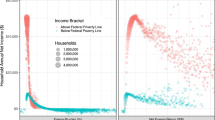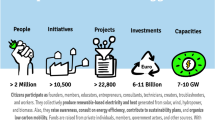Abstract
In 2010 and 2011, Republicans and Democrats proposed mandating clean power generation in the electricity sector1,2,3. To evaluate public support for a national clean energy standard (NCES), we conducted a nationally representative survey that included randomized treatments on the sources of eligible power generation and programme costs. We find that the average US citizen is willing to pay US$162 per year in higher electricity bills (95% confidence interval: US$128–260), representing a 13% increase4, in support of a NCES that requires 80% clean energy by 2035. Support for a NCES is lower among non-whites, older individuals and Republicans. We also employ our statistical model, along with census data for each state and Congressional district5, to simulate voting behaviour on a NCES by Members of Congress assuming they vote consistently with the preferences of their median voter. We estimate that Senate passage of a NCES would require an average household cost below US$59 per year, and House passage would require costs below US$48 per year. The results imply that an ‘80% by 2035’ NCES could pass both chambers of Congress if it increases electricity rates less than 5% on average.
This is a preview of subscription content, access via your institution
Access options
Subscribe to this journal
Receive 12 print issues and online access
$209.00 per year
only $17.42 per issue
Buy this article
- Purchase on Springer Link
- Instant access to full article PDF
Prices may be subject to local taxes which are calculated during checkout

Similar content being viewed by others
References
American Clean Energy Leadership Act of 2009, S. 1462, 111th Congress, Section 132.
Practical Energy and Climate Plan Act of 2010, S. 3464, 111th Congress, Section 301.
President Barack Obama The State of the Union Address Washington DC, 25 January, 2011 (2011).
Energy Information Administration Electric Sales, Revenues, and Average Price 2009 (2011).
US Census Bureau American Community Survey 5-year Estimates 2005–2009; available at http://www.census.gov/acs/.
Aldy, J. E. Promoting clean energy in the American power sector: A proposal for a national clean energy standard. Environ. Law Rep. 42, 10131–10149 (2012).
Congressional Budget Office The Effects of Renewable or Clean Electricity Standards Pub. No. 4259, July.
Paul, A., Palmer, K. & Woerman, M. Clean energy standards for electricity: Policy design implications for emissions, supply, prices, and regions Resources for the Future Discussion Paper 11–35 (Resources for the Future, 2011).
Hanemann, M. W. Welfare evaluations in contingent valuation experiments with discrete responses. Am. J. Agric. Econom. 66, 332–341 (1984).
Hanemann, M. W. Welfare evaluations in contingent valuation experiments with discrete response data: Reply. Am. J. Agric. Econom. 71, 1057–1061 (1989).
Park, T., Loomis, J. B. & Creel, M. Confidence intervals for evaluating benefit estimates from dichotomous choice contingent valuation. Land Econom. 67, 64–73 (1991).
Krinsky, I. & Robb, A. L. On approximating the statistical properties of elasticities. Rev. Econom. Stat. 68, 715–719 (1986).
Interagency Working Group on Social Cost of Carbon Technical Support Document: Social Cost of Carbon for Regulatory Impact Analysis Under Executive Order 12866 (United States Government, 2010).
Black, D. On the rationale of group decision-making. J. Political Econ. 56, 23–34 (1948).
Shepsle, K. A. & Bonchek, M. S. Analyzing Politics (W.W. Norton, 1997).
Cho, S. & Duggan, J. Bargaining foundations of the median voter theorem. J. Econom. Theory 144, 851–868 (2009).
Bafumi, J. & Herron, M. C. Preference aggregation, representation, and elected American political institutions. Am. Political Sci. Rev. (2011, in the press).
Gerber, E. R. & Lewis, J. B. Beyond the median: Voter preferences, district heterogeneity, and political representation. J. Political Econom. 112, 1364–1383 (2004).
Chupp, B. A. Environmental constituent interest, green electricity policies, and legislative voting. J. Environ. Econom. Manage. 62, 254–266 (2011).
Richer, J. Willingness to pay for desert protection. Contemp. Econom. Policy 13, 93–104 (1995).
Loureiro, M. L. & Umberger, W. J. Estimating consumer willingness to pay for country-of-origin labeling. J. Agric. Res. Econom. 28, 287–301 (2003).
Petrolia, D. R., Bhattacharjee, S., Hudson, D. & Herndon, C. W. Do Americans want ethanol? A comparative contingent-valuation study of willingness to pay for E-10 and E-85. Energy Econom. 32, 121–128 (2010).
American Clean Energy and Security Act of 2009, H.R. 2454, 111th Congress, Section 101 and Title III.
Bafumi, J. & Herron, M. C. Leapfrog representation and extremism: A study of American voters and their members of congress. Am. Political Sci. Rev. 104, 519–542 (2010).
Arrow, K. et al. Report of the NOAA panel on contingent valuation. Federal Register 58, 4602–4614 (1993).
Carson, R. T. & Hanemann, W. M. in Handbook of Environmental Economics 2 (eds Maler, K-G. & Vincent, J. R.) 821–936 (Elsevier, 2005).
Leiserowitz, A., Maibach, E., Roser-Renauf, C. & Smith, N. Climate Change in the American Mind: Americans’ Global Warming Beliefs and Attitudes in May 2011 (Yale University and George Mason University, Yale Project on Climate Change Communication, 2011); available at http://environment.yale.edu/climate/files/ClimateBeliefsMay2011.pdf.
Leiserowitz, A., Maibach, E., Roser-Renauf, C. & Smith, N. Climate Change in the American Mind: Public Support for Climate and Energy Policies in May 2011 (Yale University and George Mason University, Yale Project on Climate Change Communication, 2011); available at http://environment.yale.edu/climate/files/PolicySupportMay2011.pdf.
Energy Information Administration Annual Energy Outlook 2011 (Department of Energy, 2011).
Acknowledgements
We gratefully acknowledge the financial support of the Surdna Foundation, the 11th Hour Project and the Grantham Foundation for the Protection of the Environment for fielding the survey instrument.
Author information
Authors and Affiliations
Contributions
All authors contributed equally to this work. M.J.K. developed the survey question and A.A.L. implemented the survey instrument. The statistical analysis of the survey data was undertaken by M.J.K. and J.E.A. The estimated carbon benefits calculation was undertaken by J.E.A. Authors J.E.A. and M.J.K. developed the median voter model on the basis of the survey results. All authors participated in the drafting of the text.
Corresponding author
Ethics declarations
Competing interests
The authors declare no competing financial interests.
Supplementary information
Rights and permissions
About this article
Cite this article
Aldy, J., Kotchen, M. & Leiserowitz, A. Willingness to pay and political support for a US national clean energy standard. Nature Clim Change 2, 596–599 (2012). https://doi.org/10.1038/nclimate1527
Received:
Accepted:
Published:
Issue Date:
DOI: https://doi.org/10.1038/nclimate1527
This article is cited by
-
An ex-ante DEA method for representing contextual uncertainties and stakeholder risk preferences
Annals of Operations Research (2022)
-
Gender and climate action
Population and Environment (2022)
-
Nexus between willingness to pay for renewable energy sources: evidence from Turkey
Environmental Science and Pollution Research (2021)
-
New Perspectives on Green Energy Defaults
Journal of Consumer Policy (2021)
-
I don't Want to be Green: Prosocial Motivation Effects on Firm Environmental Innovation Rejection Decisions
Journal of Business Ethics (2017)



